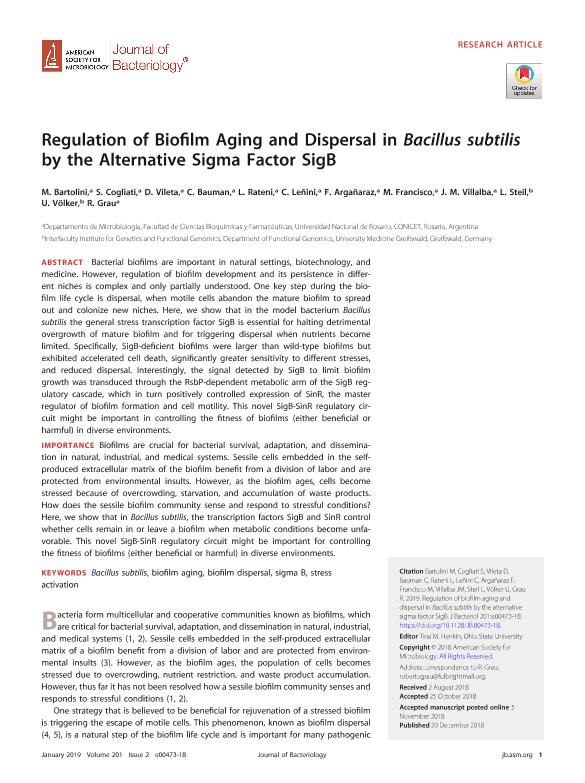Artículo
Regulation of biofilm aging and dispersal in Bacillus subtilis by the alternative sigma factor SigB
Bartolini, Marco ; Cogliati, Sebastian Claudio
; Cogliati, Sebastian Claudio ; Vileta, Dario German; Bauman, C.; Rateni, Liliana Beatriz; Leñini, Cecilia Andrea
; Vileta, Dario German; Bauman, C.; Rateni, Liliana Beatriz; Leñini, Cecilia Andrea ; Argañaraz, F.; Francisco, M.; Villalba, J.M.; Steil, L.; Völker, U.; Grau, Roberto Ricardo
; Argañaraz, F.; Francisco, M.; Villalba, J.M.; Steil, L.; Völker, U.; Grau, Roberto Ricardo
 ; Cogliati, Sebastian Claudio
; Cogliati, Sebastian Claudio ; Vileta, Dario German; Bauman, C.; Rateni, Liliana Beatriz; Leñini, Cecilia Andrea
; Vileta, Dario German; Bauman, C.; Rateni, Liliana Beatriz; Leñini, Cecilia Andrea ; Argañaraz, F.; Francisco, M.; Villalba, J.M.; Steil, L.; Völker, U.; Grau, Roberto Ricardo
; Argañaraz, F.; Francisco, M.; Villalba, J.M.; Steil, L.; Völker, U.; Grau, Roberto Ricardo
Fecha de publicación:
01/2019
Editorial:
American Society for Microbiology
Revista:
Journal of Bacteriology
ISSN:
0021-9193
Idioma:
Inglés
Tipo de recurso:
Artículo publicado
Clasificación temática:
Resumen
Bacterial biofilms are important in natural settings, biotechnology, and medicine. However, regulation of biofilm development and its persistence in different niches is complex and only partially understood. One key step during the biofilm life cycle is dispersal, when motile cells abandon the mature biofilm to spread out and colonize new niches. Here, we show that in the model bacterium Bacillus subtilis the general stress transcription factor SigB is essential for halting detrimental overgrowth of mature biofilm and for triggering dispersal when nutrients become limited. Specifically, SigB-deficient biofilms were larger than wild-type biofilms but exhibited accelerated cell death, significantly greater sensitivity to different stresses, and reduced dispersal. Interestingly, the signal detected by SigB to limit biofilm growth was transduced through the RsbP-dependent metabolic arm of the SigB regulatory cascade, which in turn positively controlled expression of SinR, the master regulator of biofilm formation and cell motility. This novel SigB-SinR regulatory circuit might be important in controlling the fitness of biofilms (either beneficial or harmful) in diverse environments. IMPORTANCE Biofilms are crucial for bacterial survival, adaptation, and dissemination in natural, industrial, and medical systems. Sessile cells embedded in the self-produced extracellular matrix of the biofilm benefit from a division of labor and are protected from environmental insults. However, as the biofilm ages, cells become stressed because of overcrowding, starvation, and accumulation of waste products. How does the sessile biofilm community sense and respond to stressful conditions? Here, we show that in Bacillus subtilis, the transcription factors SigB and SinR control whether cells remain in or leave a biofilm when metabolic conditions become unfavorable. This novel SigB-SinR regulatory circuit might be important for controlling the fitness of biofilms (either beneficial or harmful) in diverse environments.
Palabras clave:
BACILLUS SUBTILIS
,
BIOFILM AGING
,
BIOFILM DISPERSAL
,
SIGMA B
,
STRESS ACTIVATION
Archivos asociados
Licencia
Identificadores
Colecciones
Articulos(CCT - ROSARIO)
Articulos de CTRO.CIENTIFICO TECNOL.CONICET - ROSARIO
Articulos de CTRO.CIENTIFICO TECNOL.CONICET - ROSARIO
Citación
Bartolini, Marco; Cogliati, Sebastian Claudio; Vileta, Dario German; Bauman, C.; Rateni, Liliana Beatriz; et al.; Regulation of biofilm aging and dispersal in Bacillus subtilis by the alternative sigma factor SigB; American Society for Microbiology; Journal of Bacteriology; 201; 2; 1-2019; 1-14
Compartir
Altmétricas



